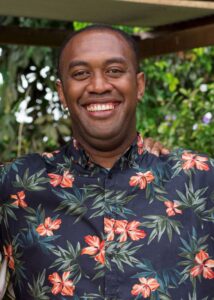Advent Devotional | Day 9: Jesus and the Davidic Promise
Ko Jisu kei na vosa ni yalayala me baleta na vuvale nei Tevita
Your house and your kingdom will endure forever before me; your throne will be established forever.
– 2 Samuel 7:16
Who is building whose house?
David had informed Nathan the prophet that he intended to build God a house. This initiative came from David’s assessment of things: He is living in a house made of cedar while the ark of the covenant still lives in a tent. In other words, it seems wrong to David that he lives in a permanent dwelling, but God (whose presence with His people is represented by the ark of the covenant) is still living in a temporary shelter. Nathan initially agrees with David’s proposal. He seems to suggest to David that his idea was a brilliant one and that he should go ahead as planned. But God spoke to Nathan that evening and gave him new instructions to take back to David. God tells Nathan that instead of David building God a permanent house, God was going to build David an eternal house.
This might sound very confusing for the Western reader, but for us in Fiji and certain parts of the South Pacific, we understand what God is saying to Nathan. Our cultural understanding of a house is similar to that of the culture of David and Nathan. For us, a house is more than just a building. A house is a family of many generations before and the generations to come. Likewise, when God speaks to Nathan about making a house for David, he is not referring to a physical building. He is referring to the Davidic dynasty, to the future generations of Davidic kings and the family they will oversee!
When we read this promise of God, we might rejoice with the Old Testament people of God because it appears they will now settle permanently in the land of promise. But our rejoicing would be short lived, because as we read the rest of the accounts of David’s sons, we realize that they were a mixed bag of good and evil kings. According to this same promise to David, God had to discipline the sons of David for their waywardness. The rest of the Old Testament records the exile and humble return of both the house of David and the people of God. The temple (the house for God) built by David’s son was destroyed, and attempts made to rebuild it saw only partial success.
The joy of belonging to David’s eternal house
However, as we turn to the New Testament, the gospel of Matthew takes us through the genealogy of Jesus and makes the point that He is the son of David. In other words, Jesus comes from the house (family) of David. He is the one through whom God’s promise is fulfilled. He is the one who will make David’s house eternal and its reach global. Jesus is the eternal son of David who was born of a virgin, who lived, died, and rose again so that even Fijians and Pacific Islanders can be part of God’s eternal household by trusting Him.
This Advent season, let us give thanks to God for how He has established the house of David as an eternal house through His son, Jesus Christ our Lord. His righteous reign will be everlasting. His house will include people from every tribe and language and people and nation. As we wait in anticipation of His return, let us remember that God will fulfill His promise no matter how bleak things may appear. He promised David an eternal house and provided the Davidic dynasty with an eternal king. Jesus our risen and eternal Lord will come again, and all of us, even Fijians and Pacific Islanders, will be part of His house (family) forever.

Pio “Tukana” Nakesu
Fiji
Tukana Nakesu is the pastor of Namadi Heights Baptist Church in Suva, Fiji. He serves as the Langham Preaching Country Coordinator for Fiji and Associate Regional Coordinator for the South Pacific.